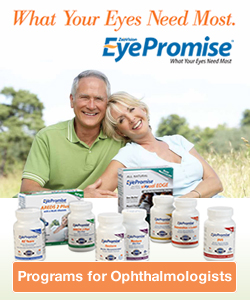

|
Omega-3 Fatty Acid-Derived Resolvins and Protectins in Age-Related Macular Degeneration
Raymond Iezzi, M.D., M.S.
Seminal work by Edwards, Hageman and others examining genetic risks for developing advanced age-related macular degeneration (AMD) have provided compelling evidence that polymorphisms in endogenous factors, such as complement factor H, that modulate the immune system are associated with disease progression and severity.1,2 Consequently, a number of therapeutic approaches are under development to modulate the immune system in an effort to slow or stop the progression of dry AMD, reducing the likelihood of progression to advanced disease.
The Age-Related Eye Disease Study (AREDS) has demonstrated that high-dose antioxidants and zinc are capable of reducing the risk of progressing to wet AMD in high-risk individuals by approximately twenty-five percent. Each of the antioxidants (vitamins C, E, beta carotene) and zinc found in the AREDS formulation have long been known to exert anti-inflammatory effects in multiple organ systems in a variety of animal models tested.3,4 In addition to examining the effects of the xanthophylls, lutein and zeaxanthin, the AREDS II study is currently examining the additional role that the omega-3 polyunsaturated fatty acids (PUFAs), eicosapentaenoic acid (EHA) and docosapentaenoic acid (DHA), may have in reducing the progression of AMD.
In addition to exerting direct anti-inflammatory actions, EHA and DHA are metabolized to form potent endogenous molecules, called resolvins and protectins, that effect resolution of inflammation and neuroprotection in nanomolar and picomolar doses.5
The resolution phase of inflammation is a metabolically active process, mediated by endogenous anti-inflammatory and pro-resolving autocoid mediators. Glucocorticoids such as endogenous cortisol serve to promote resolution in addition to exerting their anti-inflammatory effects. Many endogenous pro-resolution molecules are derived from EHA (e-series resolvins, E1 and E2) and DHA (d-series resolvins D1-D4) omega PUFAs. In nanomolar quantities, the resolvins have been shown to reduce transendothelial migration of polymorphonuclear leukocytes, migration of dendritic cells and production of pro-inflammatory interleukins. Connor et al recently demonstrated that omega-3 PUFA supplementation significantly reduced the area of avascular retina and suppressed hypoxia-induced retinal neovascularization in an oxygen-induced retinopathy mouse model. The group further identified that resolvins E1 and D1, in addition to neuroprotectin D1 (a DHA-derived neuroprotection molecule), were each capable of protecting against retinal neovascularization at a total body dose of 10 nanograms per day, intraperitoneally. This was associated with suppression of NF-κβ-induced tumor necrosis alpha production.6 Thus, the resolvins and protectins represent a unique class of endogenous anti-inflammatory and pro-resolving mediators that may also inhibit the formation of neovascularization in AMD. The prospective AREDS II study is designed to provide us with valuable new data related to omega-3 PUFA supplementation in patients with AMD. REFERENCES
|
Ingrid U. Scott, MD, MPH, Editor
Professor of Ophthalmology and
|

|



